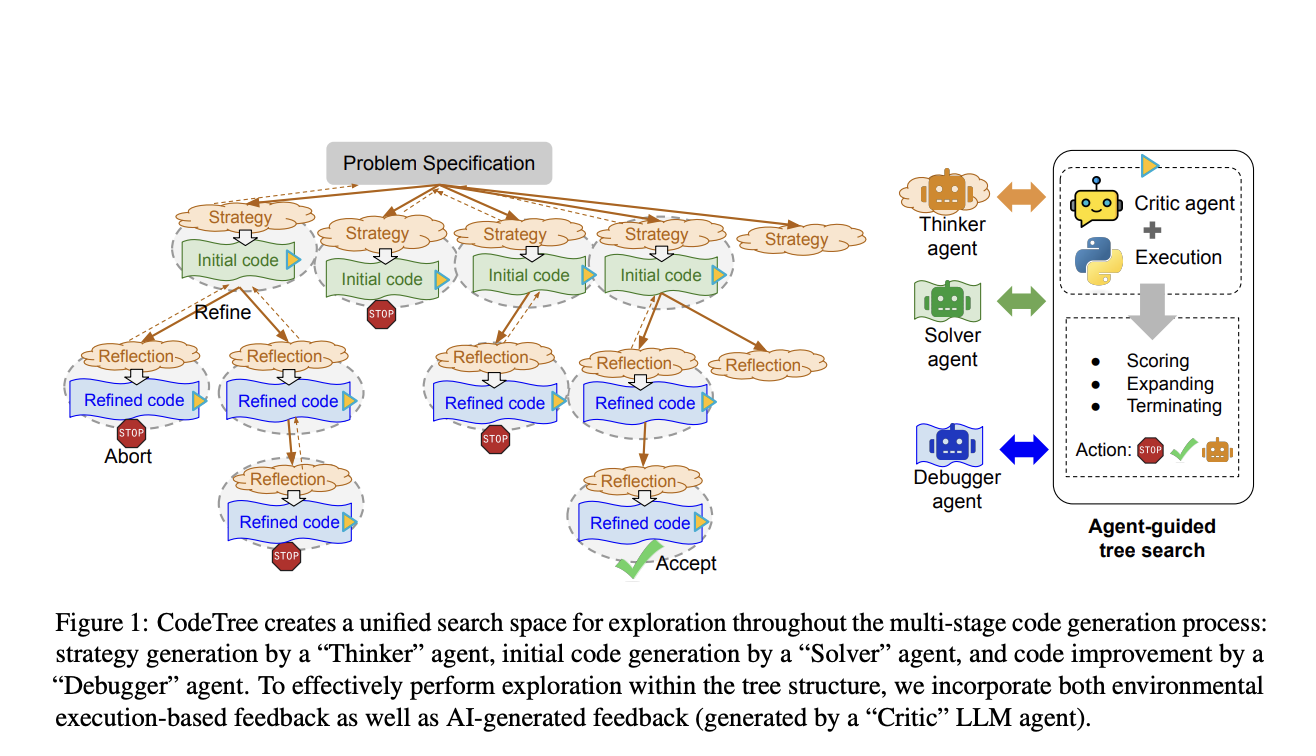
Automated Code Generation: Simplifying Programming Tasks
Automated code generation is an exciting area that uses large language models (LLMs) to create working programming solutions. These models are trained on extensive code and text datasets to help developers code more easily. However, creating reliable and efficient code remains a challenge, especially for complex problems that require both precision and creativity.
Challenges in Code Generation
A key issue in code generation is finding the right solutions among countless possibilities. Current methods often struggle with planning and debugging, particularly for complex tasks. Brute-force techniques, which generate large amounts of code, are typically inefficient, while refinement methods can get stuck with less effective solutions.
Current Approaches
Methods in use today include:
- Brute-force generation: Sampling many outputs to find correct solutions.
- Iterative refinement: Improving a smaller set of solutions based on execution feedback.
While useful, these methods often lack scalability and do not fully utilize LLMs’ capabilities for generating diverse solutions.
Introducing CodeTree: A New Framework
Researchers from the University of Texas and Salesforce Research have developed CodeTree, a revolutionary framework that addresses these challenges. CodeTree uses a tree-based structure for code generation, allowing systematic exploration and refinement of solutions. It incorporates multiple collaborative agents:
- Thinker agent: Plans strategies.
- Solver agent: Generates initial code.
- Debugger agent: Refines solutions.
- Critic agent: Evaluates and scores solutions based on feedback.
How CodeTree Works
CodeTree builds a tree where each node represents a potential solution. The Thinker agent creates various strategies, while the Solver agent produces initial code implementations. The Critic agent tests these solutions, and the Debugger agent refines or discards them based on feedback. This collaborative approach helps CodeTree efficiently find optimal solutions without redundancy.
Impressive Results
CodeTree has been rigorously tested and achieved outstanding results, including:
- 95.1% on HumanEval
- 98.7% on MBPP
- 43.0% on CodeContests
It outperformed traditional methods, especially on the SWEBench benchmark, which generates code patches for real-world projects. CodeTree’s ability to adapt its strategies allows it to handle complex tasks effectively.
Key Advantages of CodeTree
CodeTree’s search strategies, particularly breadth-first search (BFS), have proven more effective than depth-first search (DFS). The Critic agent’s role in verifying solutions significantly boosts performance. CodeTree can adjust its exploration based on problem complexity, making it a versatile tool for automated code generation.
Scalability and Efficiency
CodeTree is not only efficient but also scalable. With a limited generation budget, it still achieved high accuracy across benchmarks, indicating its potential for practical applications in software development and competitive programming.
Conclusion
CodeTree represents a major advancement in automated code generation, combining structured exploration with multi-agent collaboration. It effectively addresses the limitations of existing methods, providing a powerful solution for complex coding challenges.
For further insights and to explore how AI can transform your business, follow us on Twitter, join our Telegram Channel, and connect with us on LinkedIn. If you appreciate our work, subscribe to our newsletter and join our 60k+ ML SubReddit.
If you’re ready to enhance your company with AI, consider how CodeTree can help you stay competitive. Identify automation opportunities, define measurable KPIs, select the right AI tools, and implement them gradually. For AI KPI management advice, reach out to us at hello@itinai.com. Stay updated on AI insights via our Telegram or Twitter.























